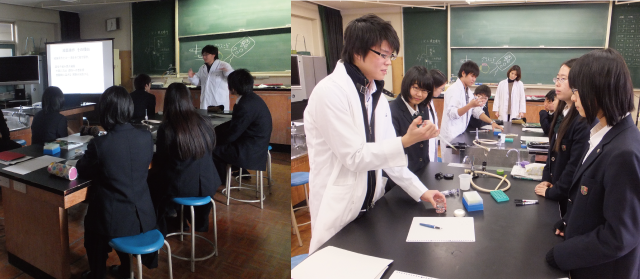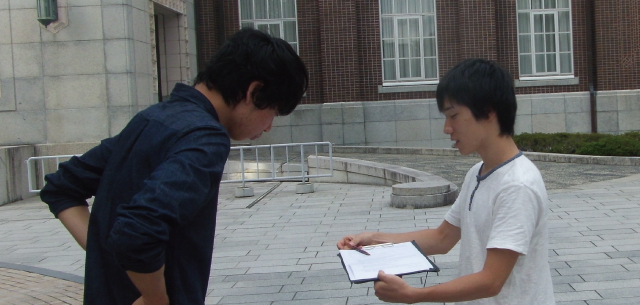Team:Kyoto/Humanpractice
From 2013.igem.org
count down
Contents |
Human Practices -To spread LIFESCIENCE throughout the world
In 2010, iGEM Kyoto and other iGEM teams in Japan carried out an attitude survey towards genetically modifying and genetically engineering. We concluded that It seems that people only have abstract and unclear image to this 'professional' technique. Genetic engineering is not still so common in Japan. And many people worry about safety. So engineers are desired to develop safety of biotechnology and spread knowledge about biotechnology.” Considering this conclusion, it is important to enrich the people's knowledge on biotechnology when we want public people to accept biotechnology more. Therefore, we carried out these activities as below.
Life Science Seminar in High School
Toyonaka high school is a Super Science High School(SSH) and conduct programs to increase the number of students who learn university-level biology. As one of the programs, we held a seminar in Toyonaka high school at (###date###). In this seminar, we taught molecular biology and experiment to students. Through this activity, students seem to feel familiarity with life science and we could give essential knowledge through the experience of experiment. We believe that this activity can contribute to future understanding of biotechnology.
Poster session at the school festival
Our University has a school festival called November Festival (NF) every year. This is one of the biggest events in our university and many people from all around Japan visit it. This year, iGEM Kyoto presented our project to these visitors by poster session, and this was actually broadcasted by a popular Japanese TV news program(Mezamashi TV). Through this TV program, we were able to spread our activity to the general public, and succeeded in increasing general knowledge towards biotechnology and life science.
The 4th international symposium on liberal arts and general education
The 4th international symposium on liberal arts and general education is a large scale symposium where many students and public people visit. Therefore, it is a good opportunity to enrich people's knowledge on biotechnology and life science to many people. Through presenting our iGEMs’ project here, we enriched people's understanding on life science. Additionally, we received the "Einstein" prize.
International Student Seminar
iGEM Kyoto participated in ISS, short for International Student Seminar. In this seminar いっぱいいろんな人来たよ 外国人もいっぱい来たよ 英語でプロジェクトのプレゼンしたよ それを通していろんなひとのライフサイエンスに対する知識を増やしたよ
このような活動を行ってきた。
iGEM Kyoto participated in International Student Seminar(ISS). This is a seminer for young scientist from all over the world. Men and women in all ages including many foreigners visited this seminar. We made presentation about our project in English. Through this project, we have given knowledge about life science to many people.
Join "START"
iGEMKyoto joined a party of “START”in April and welcomed new students to made iGEM’s activity more common. START is union that consists of 25 students’ organizations, and those 25 organizations encourage students’ contribute to global society. For example, help students who want to study abroad, practice English to work in global society, and communicate with foreign universities. Additionally, most of those organizations perform international scene or positively contribute society so some famous companies or volunteer organizations visited that party. We advertised iGEM and succeeded to make synthetic biology more popular.
アンケート調査
こういった活動を行う中で知識の差だけではなく他の要因も存在するのかどうかも確かめてみようと考えた. We carried out these activities, however, we thought whether そこで、私たちはアンケート調査を行った。
(要改訂)We had been carrying out these activities. However, we have realized that there is another cause of the fact that people are not positive to the fruits of biotechnology. Then, in order to unravel the cause, we conducted a questionnaire survey
- アンケートの方法
アンケートは選択肢形式にし、質問の初めに性別、出身国、年齢、宗教、職業を応えてもらい、それぞれの要素が回答にどのように影響してくるのかを調べた。また、外国人へのアンケートは、現地で実際に取ったほか、京都に来ている観光客からも集めた。(どこでやったか書く)
アンケートは以下のものを使用した。
- アンケートの内容
Questionnaire!!!!
Q1 Have you ever thought about experiments using living things?
1 Yes
2 No
Q2 Do you think these experiments using living-creatures are permissible? Please give X as many as you think it is permissible.
1 check
2 no check
Q2.1 Subjects are killed in the experiment, but it can save people in disease.
Q2.2 Subjects can be killed in the experiment, but it can save people in disease.
Q2.3 Subjects are not killed in the experiment but they never go back in nature. However, it can save people in disease.
Q2.4 Subjects are only observed in nature and it can save people in disease.
Q2.5 Subjects are killed in the experiment, but it can improve our life.
Q2.6 Subjects can be killed in the experiment, but it can improve our life.
Q2.7 Subjects are not killed in the experiment but they never go back in nature. However, it can improve our life.
Q2.8 Subjects are only observed in nature and it can improve our life.
Q2.9 Subjects are killed in the experiment, but it can advance science.
Q2.10 Subjects can be killed in the experiment, but it can advance science.
Q2.11 Subjects are not killed in the experiment but they never go back in nature. However, it can advance science.
Q2.12 Subjects are only observed in nature and it can advance science.
Q3 How much do you know about genetically modifying (GM) technology?
1 I know well.
2 I know only its name.
3 I do not know at all.
Q4 Do you think modifying creature’s gene is ethically permissible or not?
1 Yes, we can modify every creatures’ gene.
2 Partly yes, some can be but others are not.
3 No, any living things’ gene cannot be modified.
Q5 Who answered ‘partly yes’ to the fifth question, please answer this question. Which of these creatures’ gene can be modified? Please give X as many as you think it is permissible.
1 check
2 no check
Q5.1 Bacteria Q5.2 wheat Q5.3 honeybee Q5.4 killifish Q5.5 frog
Q5.6 chickens Q5.7 mouse Q5.8 dog Q5.9 monkey Q5.10 human beings
- result
Q1
When we see fig?(?=該当するfigの番号) and fig? there doesn't seem any difference.
When we see fig? the number of 20s to 50s people who chose yes is larger than that of other generation.
Q2
The standard of the answer to this question is whether the answer places an importance on the profit they may gain through animal experiments, or the agony the animals feel through these experiments.
We asked whether animal experiments can be allowed from three points, “saving human beings”, “useful to our life”, “contribution to the development of science”
As a result, people who answered that animal experiment can be performed if it is for saving human beings was obviously larger than the other two points.
As for the difference by sex, male seems to be more generous to animal experiment, and place an importance on the profit of the human beings while female seem to place an importance on the animals’ pain.
When we compared by the salary or age, there seemed to be no significant difference.
問4 信仰の有無で
Yes p=0.238593 Partly yes p=0.377508 No p=0.011818
Yes,Partly yes は有意差がない
No は有意差があるといえる
よって信仰の有無が許容度に影響を与えている可能性がある
<X^2検定の説明> X²検定:実測度数と期待度数との差を統計的に検定する 算出した確率(P-value)が0.05未満であると、統計的に有意性が確認される。 Chi-square test: To test statistically the difference between the expected frequency with the measured frequency If calculated probability (P-value) is less than 0.05, significance is confirmed statistically.
Q5
Significant difference is observed in the results by different sex, region, religion. According to the difference of gender, men tend to allow genetically modification than women.
According to the regional differences, half of the people of Asia have allowed the experiment of wheat and E. coli. Subsequently, the rat is about 35%, monkeys and dogs is about 20%. In comparison, people of Europe are generally allowed experiments wheat and E. coli. However, 15% people of them have allowed the other animals. This trend is similar to the results of the graph were compared Buddhism and Christianity. The parameter is small, but the graph of the Christians of Asia is similar to the graph of Christians in the world. From this date, we think this difference is a thing by religion.
英訳案2 Significant difference was observed in the results by different sex, region, religion. According to the difference of sex, men tended to allow genetically modification than women. According to the regional differences, half of the people in tnis survey in Asia admiited using wheat and E. coli for experiments. About 35% of them admited using mice and about 20% admited using dogs and monkeys. On the other hand, people in Europe are generally allowed experiments wheat and E. coli. However, 15% people of them have allowed the other animals. This trend is similar to the results of the graph were compared Buddhism and Christianity. The parameter is small, but the graph of the Christians of Asia is similar to the graph of Christians in the world. From this date, we think this difference is a thing by religion.
- 結論
- 結論
2013年のアンケートでは知識での差は出ず、宗教の差が出た。
しかし2010年のアンケートは知識の差が出ている。
今回は合成生物学を受け入れる知識以外の理由を探る目的で、知識に関する問いを少なくしたので、知識の差が出なかった。
2010と2013を踏まえて、私たちは誰かの信仰に干渉したり、私たちの考えを誰かに押し付けられないので、個人の信仰について配慮しながら、合成生物学についての知識を広めていくべきだ
In the result of the questionnaire we conducted in 2013, we can see the influence of religion. To the contrary, the effect of knowledge level is not observed. However, in the questionnaire in 2010, people’s attitude vary according to knowledge level. In this time, since the aim is shed light on effect except for knowledge, we made fewer question to measure knowledge level. This is why knowledge level made next to no affection in this survey. Learning from the result of the two survey, because we should not interfere with others’ religion and opinion, we must disseminate information about biotechnology considering each individual person’s religion.
- Future Work
- Future Work
宗教と知識について深める
 "
"




